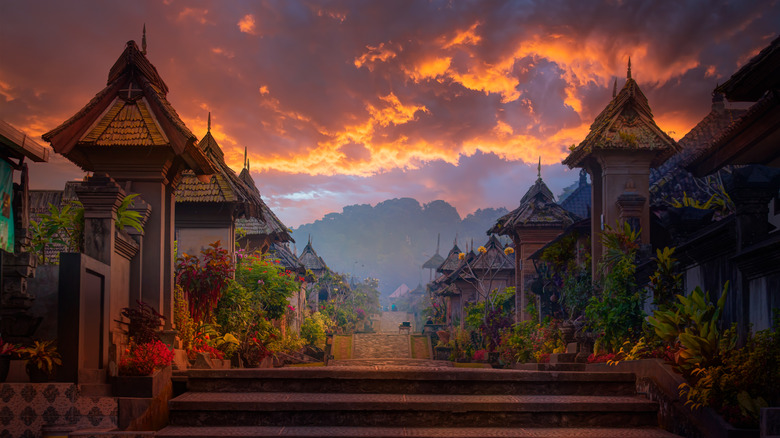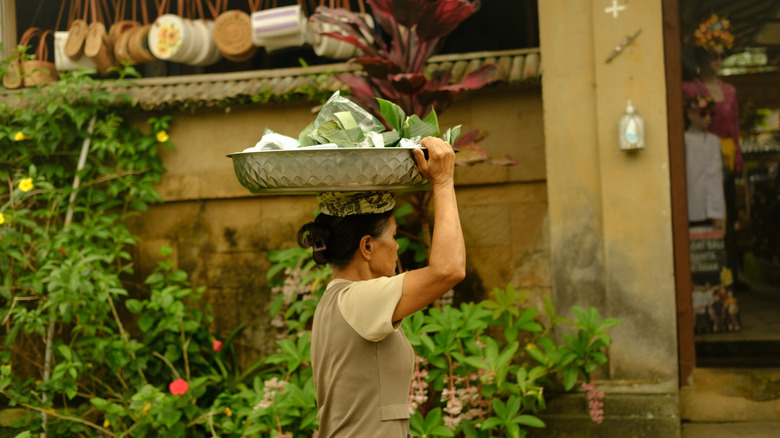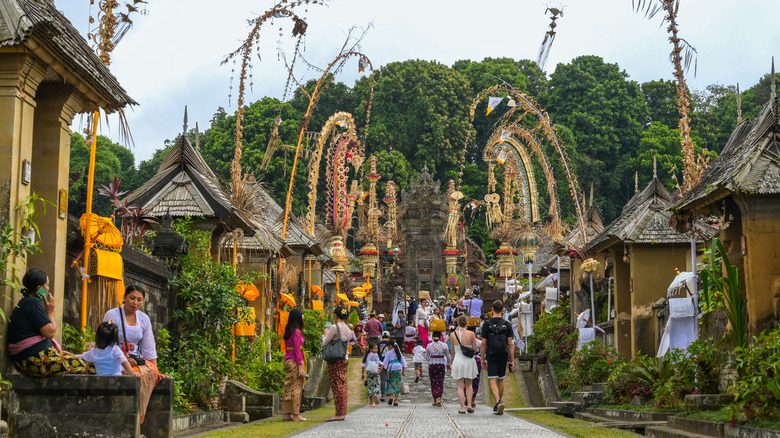One Of The World's Cleanest Villages Offers An Authentic Bali Experience With Renowned Beauty
Bali is best known for its sweeping white sand beaches, azure waters, and rich cultural heritage that shows up in its many temples, shrines, and local festivals. The relatively small Indonesian island in Southeast Asia holds more travel gems once you make your way inland, from rice fields amidst rolling green hills to ancient sites. The serene inland region of the island is largely responsible for making Bali one of the best destinations in the world for a wellness vacation. What makes it particularly fun to explore is the plethora of small towns and villages that each have their own character. There's Pererenan, considered to be the "coolest" seaside village in the world for its black sand beaches and laid-back surf culture. Then, on the opposite end of the spectrum but equally worth a visit, there is one of the world's cleanest villages — Penglipuran.
While some destinations may try to present a facade of neatness to their most visited areas, Penglipuran is different. Cleanliness and living in harmony with nature are tenets deeply ingrained within the locals of this East Bali village, which dates back to the 14th century. From sustainable construction using local bamboo to waste segregation and recycling, the people of Penglipuran follow best practices more effectively than most green cities. It's no surprise, then, that Penglipuran was named one of the three cleanest villages in the world, along with Mawlynnong in India and Giethoorn in the Netherlands. However, it isn't just cleanliness; the village also holds ancient temples, traditional houses unlike any others in Bali, and is situated in the Bangli District surrounded by a bamboo forest.
Cleanliness is part of Penglipuran's culture
While Penglipuran was recognized for its cleanliness by the Dutch organization Green Destinations Foundation back in 2019 (which boosted tourist numbers even further), the village has continued to remain pristine and beautiful. It has since won several more accolades, including U.N. Tourism's award for the Best Tourism Village for 2023. One of the major reasons the village is able to retain its clean nature is because trash is regularly sorted and put to good use. Organic waste is decomposed and used as fertilizer, while the rest is recycled and sold. Furthermore, the proceeds from selling inorganic waste are then funneled back into the village.
Walk through the village's cobbled streets and you will find yourself surrounded by another major reason for the village's pristine surroundings — bamboo. While the sturdy plant is used across Bali for construction, in Penglipuran, it is even more widely employed in building homes, furniture, tools, and much more. Harvesting materials from the forest that surrounds the village helps avoid bringing in construction materials from outside, adding to the sustainable practices and enclosed ecosystem that thrives in the village.
This idea of an enclosed ecosystem also extends to the village's tourism revenue, as there is an entry fee to visit. The money made from tourism is used for the development and upkeep of the village. Since many of the locals make their money from visitors, they also contribute a small portion of their proceeds to the village fund, making Penglipuran a community-based tourist destination.
Planning a trip to Penglipuran
Penglipuran is a village unlike any other for several reasons, and it's probably the only one you'll visit that has timings. Travelers can enter the village between 8 a.m. and 6:30 p.m. and spend the day exploring. The village is small enough to see everything in a day, so you won't have to return and pay the entry fee again. However, if you really want to stay longer, there is overnight accommodation available at the Penglipuran Homestay Hotel.
Getting to Penglipuran is easy from most popular Bali destinations as well as its main international airport in the capital city of Denpasar. The approximately one-hour drive will, however, require a private taxi or tour booking since public transport options are limited. Fortunately, private transport isn't too expensive in Bali, and the ride should cost around $40. Since the village is located inland and at a higher altitude, Penglipuran has pleasant weather for most of the year. However, the monsoon season can make planning difficult due to sudden showers, so avoid visiting between November and May.
During your visit, be sure to head to the village's oldest temples — Pura Desa and Pura Puseh. If you hear traditional music ringing through the village, it is most likely a Barong performance, which entails dance and mythological storytelling. If you're more the hands-on type, you should try a few traditional crafts like bamboo weaving or take a Balinese cooking class while there. Also, to make sure you have the best experience possible, take a look at these travel hacks for the perfect Bali vacation.


